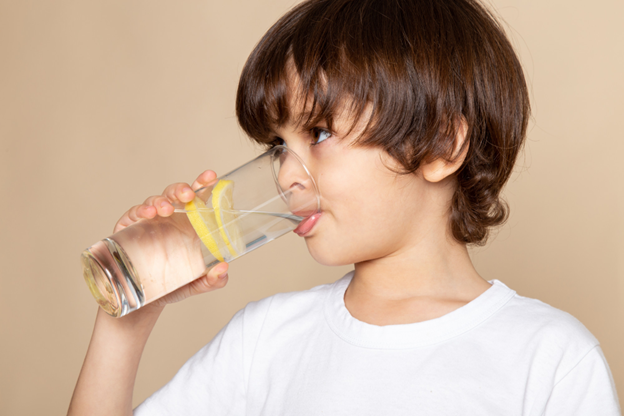Keeping kids hydrated can sometimes feel like a tricky task, especially when they’re running around and forgetting to drink water. Recognizing dehydration in children is crucial, so as a parent, you need to know the top signs to watch out for. This guide will help you spot these signs and take the right action.
Understanding Dehydration in Children
Dehydration in children occurs when kids lose more fluids than they take in. It’s a serious issue because children’s bodies are small, and they can get dehydrated faster than adults. They need water to feel good, stay active, and grow.
Common causes include playing outdoors in hot weather, while not drinking enough water. Sometimes, a fever, diarrhea, or vomiting can also lead to losing too much fluid. Kids often forget to drink water when they’re busy playing or studying. Plus, they might not feel thirsty until they are already dehydrated. Simple habits like not drinking enough during meals or avoiding fluids they find boring, like plain water, can increase the risk. Keeping these factors in mind helps prevent dehydration in children.
Recognizing the Early Signs of Dehydration in Children
Spotting dehydration in children early can prevent serious health problems. Here are symptoms you should not ignore:
- Dry mouth and tongue: When your child’s mouth feels dry or sticky, it’s a red flag.
- Fewer tears: Crying without tears is a clear sign.
- Dark yellow urine: It should be pale; a darker color signals dehydration.
- Less frequent urination: Not using the bathroom as usual can indicate a lack of fluids.
- Fatigue or dizziness: If your child feels dizzy or tired all the time, it could be due to dehydration.
Some people believe thirst is the first sign, but by the time your child feels thirsty, they’re likely already a little dehydrated. Misconceptions can include thinking only hot weather causes dehydration, overlooking the fact that even during colder weather, children must stay hydrated.
Causes of Dehydration in Children
Let’s explore what can cause dehydration in children, especially in places like India:
- Hot climate: In India, the heat can lead to heavier sweating, increasing the need for more fluid intake.
- Diet and habits: Drinks like soda might replace water, leading to dehydration.
- Routine and lifestyle: Busy schedules with sports or playtime require more water intake.
Physical activities make them sweat more, quickly used up the fluids their bodies need. Illnesses like a fever or stomach bugs can rapidly increase the need for replenishment, too.
Effective Treatment for Dehydration in Children
Mild to moderate dehydration in children can often be treated at home. Here are some simple remedies: – Oral rehydration solutions (ORS): These are easily available and help replenish lost electrolytes. – Encourage drinking water: Sip frequently, rather than consuming large amounts at once. – Foods with high water content: Watermelon, cucumber, and oranges help hydrate well.
When symptoms are severe, like confusion or persistent weakness, medical professionals might administer intravenous (IV) fluids to quickly restore the necessary balance. They’ll assess the child’s needs and adjust the treatment accordingly. It’s important to seek professional advice if home remedies don’t work quickly or symptoms worsen.
The Impact of Hydration on Child Development
Hydration plays a huge role. When dehydration in children occurs, it can mess with how the brain works, affect mood, and make them less energetic. Proper hydration helps kids concentrate better and improves learning at school.
The long-term effects of dehydration in children can dampen growth. Kids might not develop physically or mentally the way they should, leading to lasting health issues. Chronic dehydration can contribute to kidney stones and urinary issues over time, which is why keeping kids well-hydrated daily is so vital.
Preventing Dehydration in Children: Proactive Steps and Measures
Here are actionable tips to prevent dehydration in children: 1. Regular water breaks: Ensure your child takes regular sips of water throughout the day. 2. Pack a water bottle: For school or outdoor activities, always pack a bottle. 3. Offer a variety of fluids: Broths, smoothies, and diluted juices are great options. 4. Monitor activity levels: Be mindful of their time spent in the sun or during physical exertion.
In tropical climates, the need for increased fluid intake rises due to excessive sweating. For active children, it’s essential to replenish fluids before, during, and after physical activity to maintain their energy levels and prevent dehydration.
Timely Diagnosis of Dehydration in Pediatric Patients
Diagnosing dehydration in children can be straightforward with a few techniques you can utilize at home or seek in a clinic:
- Skin elasticity test: Gently pinch the skin on the back of the hand and see if it returns to normal quickly or not.
- Monitor urine color and frequency: Keep an eye on the color and number of times they urinate.
Doctors might use simple tests to check dehydration levels and help guide the right treatment. Observing symptoms like irritability, sunken eyes, and a dry tongue can also help in gauging how your child is coping with their hydration needs.
By staying informed and proactive, you can better safeguard your child’s health and ensure they stay happy and hydrated!
Consult us today at Vraj Multispecilaty hospital for expert guidance!

